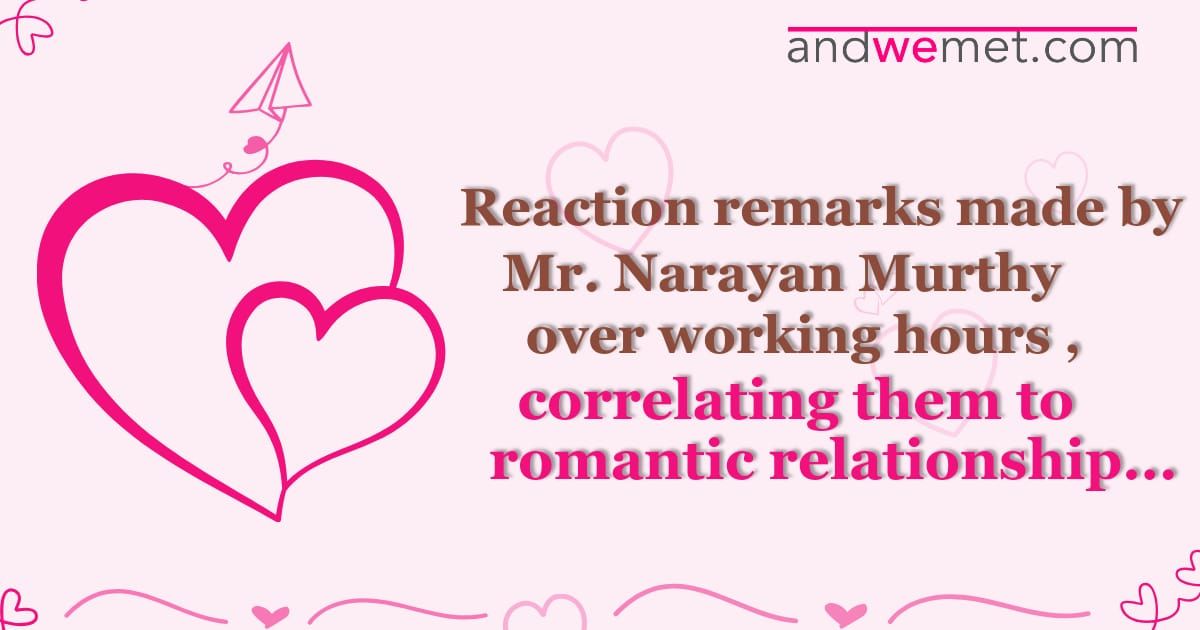Mr Narayan Murthy’s 70 hours work week comment and its relevance to romantic relationships.
Learn from Narayan Murthy's interview on productivity to transform your relationships. Avoid misunderstandings, decode real-life examples, and prioritize clear communication for a stronger, healthier love life.

A recent interview of Mr Narayan Murthy went viral, where he was asked a question on India’s productivity. He responds by saying we need to be productive as a nation, and goes on to say youngsters need to put in more hours at work. He unfortunately was not asked to elaborate on what he meant in the ‘productivity’ comment, leading each one of us to infer our own assumptions. The result - the comments made in the interview has led to weeks of discussion with various opinions, mostly unfavorable. Interestingly when I last checked, the interview had been watched by 21k only, but the outpour of comments, opinions surpassed the number of the actual views on the actual interview.
So, how does this example make it relevant to romantic relationships? This outpour is an example of misunderstanding when situations are poorly communicated leaving a greenfield to play for roles of various assumptions.
Mr. Murthy’s example apart, I have three more examples to make my point on the need to communicate better.
The first example- Consider two people on a date, where one has reached and the other is running late. The one who is delayed sends a text message saying - ‘hey sorry, I am running late, I will see you soon”. It’s easy to see that each one of us could interpret this differently. Some of us might find it unacceptable, because not doing something on time might feel like someone is being disrespectful to us. This could irk the person who is waiting, where they may leave or the date may not start on a good note.
However, consider how this could change if the communication shared were more detailed. What if the message were, “you must have reached, I am delayed, I will reach within the next XX minutes as I was in the midst of work and overlooked the time / or I left on time but overlooked the delay the traffic could cause etc. I will make up for it when we meet. These reasons may sound frivolous, but are true, I am not feeling good about it, see you soon”.
Compare these two messages. While the intent of both may be same in the sender’s head the latter communicates it, the former does not. Someone sending the former message may not have the date waiting, while someone sending the latter may start something special on their first date.
Let’s look at a second example- A couple is proceeding into a committed relationship and one partner communicates that their parents will be living with them. The way it is communicated may come across as an assertive statement, whilst the communicator may not intend it that way. But such a statement could end the relationship. However this could be different if the person communicated the statement in an open ended way saying, “hey my parents will need us to be around them, I was thinking they can live with us, what do you think?” The couple may discuss and decide to live in two homes as neighbours. Other solutions may be found that may work for both and relationships may not end up falling apart over this.
The third example -I give time to people who seek dating advice. One of the common questions asked is “how do I know what is the prospect match thinking, how do I know if all is going well or not so?” My response to such questions is asking them to direct the same question to the person they are dating vs putting themselves through assumption or overthinking.
If you wish to be in a healthy relationship then you may need to up your game of communication. Expecting the possible partner to read the mind or overly relying on assumptions can lead to miscommunication as in all the above examples.
Take control over your relationship by giving priority to communication with minimum to no time for overthinking and assumptions.
